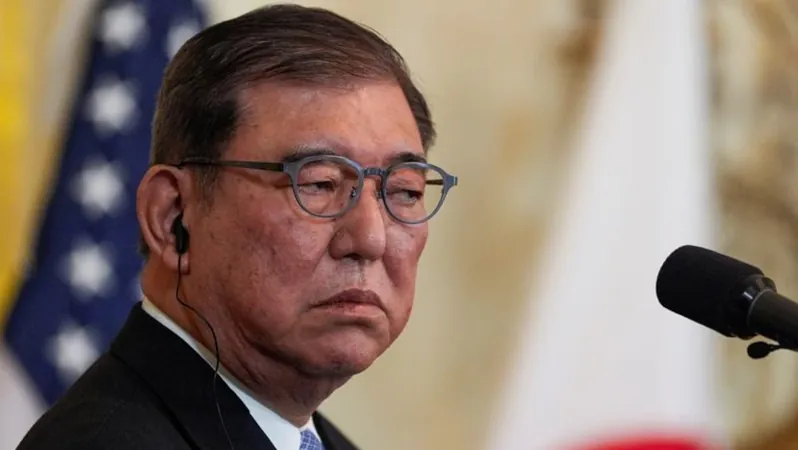
Japan's Bold Strategy to Battle U.S. Tariffs: A Comprehensive Approach Revealed!
2025-04-07
Author: Yu
In a critical move that could reshape international trade dynamics, Japanese Prime Minister Shigeru Ishiba announced on Monday (April 7) that Japan is preparing a comprehensive "package" of measures aimed at persuading the United States to alleviate heavy tariffs imposed on its exports. This announcement comes just ahead of a highly anticipated phone call between Ishiba and President Donald Trump, amidst growing tensions over trade policies.
Recently, President Trump imposed a staggering 24 percent tariff on imports from Japan, which is one of the United States' most important allies. This decision marks a significant escalation in what Trump describes as a move towards global "reciprocal" tariffs. Ishiba stressed the importance of presenting these measures as a unified package rather than piecemeal, according to statements made in Japan's parliament.
Among the proposals being considered is Japan's involvement in a colossal natural gas pipeline project in Alaska, which Trump previously mentioned as an area where Japan could play a transformative role. This partnership could not only strengthen economic ties but also reduce Japan's energy dependency.
In the wake of Trump's tariff announcement, Japan's stock market took a nosedive, with the Nikkei 225 index plummeting nearly 8 percent as investors sought refuge in more stable assets. This drastic market reaction highlights the deep concerns among investors regarding Japan’s economic stability in light of increasing protectionist policies.
Japan's influential business federation, Keidanren, also voiced alarm over the current trade landscape. Chairman Masakazu Tokura warned that the world is at a "crossroads" regarding the future of free trade, which has thrived since the end of World War II, largely driven by American leadership. Tokura's comments underscore an urgent need for cooperative efforts to uphold the values of free trade amidst rising protectionism.
Adding to the strain, alongside the 24 percent tariffs on Japanese goods, Trump has instituted 25 percent levies on cars imported from abroad, a decision that directly impacts Japan's vital auto sector. This industry is integral to Japan's economy, employing approximately 5.6 million people either directly or indirectly. In fact, autos represented about 28 percent of Japan's £21.3 trillion (US$142 billion) in exports to the United States last year, underscoring the significant economic stakes at play.
As Japan gears up for negotiations, the global community will be watching closely to see how these developments unfold and whether Prime Minister Ishiba can successfully forge a path toward tariff relief with the U.S. government. Will this "package" proposal be enough to sway Trump, or are we witnessing the beginning of a more protracted trade battle? Stay tuned as this story continues to evolve!

 Brasil (PT)
Brasil (PT)
 Canada (EN)
Canada (EN)
 Chile (ES)
Chile (ES)
 Česko (CS)
Česko (CS)
 대한민국 (KO)
대한민국 (KO)
 España (ES)
España (ES)
 France (FR)
France (FR)
 Hong Kong (EN)
Hong Kong (EN)
 Italia (IT)
Italia (IT)
 日本 (JA)
日本 (JA)
 Magyarország (HU)
Magyarország (HU)
 Norge (NO)
Norge (NO)
 Polska (PL)
Polska (PL)
 Schweiz (DE)
Schweiz (DE)
 Singapore (EN)
Singapore (EN)
 Sverige (SV)
Sverige (SV)
 Suomi (FI)
Suomi (FI)
 Türkiye (TR)
Türkiye (TR)
 الإمارات العربية المتحدة (AR)
الإمارات العربية المتحدة (AR)